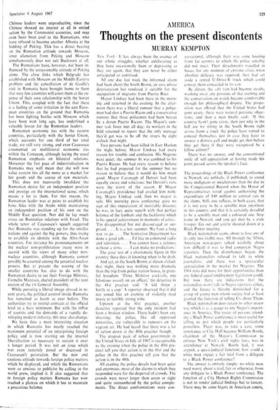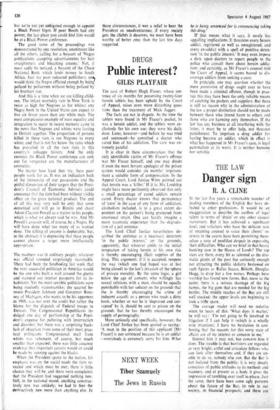Thoughts on the present discontents
AMERICA MURRAY KEMPTON
New York—lt has always been the essence of our ethnic struggles, whether exhilarating as
they have occasionally been or depressing as they are again, that they can never be either anticipated or contrived.
All one day last week the informed alarm had been about the South Bronx, an area whose deterioration has rendered it suitable for the occupation of migrants from Puerto Rico.
Mayor Lindsay had been there in the morn- ing and returned in the evening. In the after- noon there was a liberal rumour that a police- man had shot a Puerto Rican and a conservative rumour that three policemen had been beaten by a dozen Puerto Ricans. The Mayor's sum- mer task force met all day; its workers in the field returned to report that the only message they'd got was to be off the streets by eight o'clock that night.
Two persons had been killed in East Harlem the night before. Mayor Lindsay had every reason for trouble and confusion. His Negroes were quiet; the summer fit was confined to his Puerto Ricans. He had every reason to believe that he had prepared for the summer but no reason to believe that it would do him much good. Mayor Cavanagh of Detroit had been equally aware and solicitous; but Detroit's riots were the worst of the season. If Mayor Cavanagh's providence had availed him noth- ing, Mayor Lindsay said, then no mayor is safe. His morning press conference gave no sign of this expectation of inevitable disaster; he was, in fact, quite superb with that perfect balance of the lambent and the lacklustre which is his special achievement in moments of crisis: 'I'm disappointed but not discouraged or sur- prised.. . . It is a hot summer. We have a long way to go. . . . The Sanitation Department has done a good job.... I'd like to commend radio and television. ... You cannot have a sickness without a virus.... I can make no predictions.'
The great test of a charismatic figure in this country these days is knowing when to be drab.
And yet, in the South Bronx at eleven o'clock that night, there was nothing more dramatic than the trip from police station house, in grate- ful boredom. 'Three Molotov cocktails, one felonious assault on an officer,' the detective in the 41st precinct said. 'A kid threw a bottle at a cop.' A reporter observed that it did not sound like an evening of violently mad music or terribly strong wine.
Uptown at the 41st precinct, another detective reported that the only incident had
been a broken window. There hadn't been any shooting; the police, like all oppressed minorities, are vulnerable to rumours on the vagrant air. He had heard that there was a lot of action down at the 40th precinct though.
The utopian peak of urban government in the United States in July of 1967 is recognisable as the evening when the police in the 40th pre- cinct tell you that action is in the 41st and the police in the 41st precinct tell you that the action is in the 40th.
All evening the police details had been quiet and enormous; most of the alarms to which they
responded were for the dispersal of crowds. The crowds were never larger than seven or eight and quite outnumbered by the police comple- ments. The direct confrontations were con-
versational, although there was some hooting from far corners to which the police sensibly did not react. Their detachments travelled in buses; for any moment of extreme crisis, when absolute delicacy was required, they had set aside a rented U-Drive-It truck which could convey them concealed in its van.
By eleven, the soft rain had become steady, washing away any passions of that evening and the conversation on watch became comfortable enough for philosophical dispute. The propo- sition was offered that the United States had gone crazy; there were natural patriotic objec- tions; and then a man finally said: 'If this country hasn't gone crazy, then just why in the hell are we sitting in the South Bronx right
across from a truck the police have rented to conceal themselves just in case they have to answer a distress call and might get shot before they get there if they were recognised by a fellow citizen?'
There was no answer, and the conventional smile of self-appreciation at having made his point passed across the speaker's face.
The proceedings of the Black Power conference in Newark are unlikely, if published, to sound more malignant or mischievous than the day in the Congressional Record when the House of Representatives voted against authorising the expenditure of $40 million to control rats in the slums. Still, one reflects, in both cases, that it is not easy to be a sensible man anywhere in this country and that it is certainly dreadful to be a sensible man and a coloured one. Stay home in Newark and you get shot by a state trooper. Go out and you're shouted down at a Black Power meeting.
Black nationalism seems about to lose one of its only two visible uses. MI through the 'fifties, American newspapers talked wistfully about how difficult it was to find competent Negro reporters. Then the disturbances began; the black nationalists refused to talk to white journalists; and there was a spectacular appreciation in the market for Negroes. The 1964 riots did more for their opportunities than any federal equal employment legislation could. But now there are indications that the nationalists s n't talk to Negro reporters either, and the future is thereby diminished for a group of young men whom society had at least granted the function of telling Us about Them.
Black nationalism does retain its other major use, which is as a gauge to any Negro's import- ance in America. The roster of persons attend- ing a Black Power conference is most useful for telling us just which people are particularly powerless. There was, to take a case, some annoyance at City Hall because William Booth, chairman of the Mayor's Commission to enforce New York's civil rights laws, was in attendance' at Newark. Booth had, it was argued, a quasi-judicial function; how could a white man expect a fair trial from a delegate to a Black Power conference?
The answer is entirely simple; no white man need worry about a trial, fair or otherwise, from any delegate to a Black Power conference. The function of a City Human Rights Commission is not to render judicial findings but to lament. There may be some bigots in American courts,
but we're not yet unbigoted enough to appoint a Black Power bigot. If poor Booth had any power, the last place you could find him would be at a Black Power conference.
The good sense of the proceedings was demonstrated by one resolution, unanimous like all the others, calling for a boycott of 'Negro publications accepting advertisements for hair straighteners and bleaching creams.' Not, it must sadly be noticed, a boycott of the Chase National Bank which lends money to South Africa. Just the poor coloured publishers; on % would think the Negro afflicted enough by being' policed by policemen without being policed by his brothers too.
And this is a time when we are killing child- ren. The infant mortality rate in New York is twice as high for Negroes as for whites; any Negro born in the United States can expect to live six fewer years than any white man. The most conspicuous example of mass equality and integration to occur in recent memory came in the news that Negroes and whites were looting in Detroit together. The proportion of persons killed in these riots is ten Negroes to every white; and that is not far below the ratio which has prevailed in all the race riots in this country's unhappy history. And the only enemies the Black Power conference can seek out for vengeance are the manufacturers of cosmetics.
No matter how hard they try, these poor people work for us. It was an indication both of the immensity of our possessions and the pitiful dimension of their targets that the Presi- dent's Council of Economic Advisers could announce that the riots had been without visible effect on the gross national product. The end of all this may very well be only that some demented soul will go to Bimini and shoot Adam Clayton Powell as a traitor to his people, which is what we always said he was. And Mr Powell's assassin will, of course, be a Negro. He will have done what too many of us wanted done. The killing of anyone is deplorable; but, in the abstract, it is depressing that these people cannot choose a target more intellectually appropriate.
The madness was in ordinary people; whatever was official sounded surprisingly reasonable. There had been the foreboding last week that the next successful politician in America would be the one who built a wall around the ghetto and stamped out interior passports for its in- habitants. Yet the most sensible politicians were being studiedly statesmanlike; the quarrel be- tween President Johnson and Governor Rom- ney of Michigan, who wants to be his opponent in 1968. was not over the credit but rather the blame for the dispatch of Federal troops to Detroit. The Congressional Republicans in- dulged one day of partisanship at the Presi- dent's expense for paltering with insurrection and disorder; but there was a surprising back- lash of objection from some of their most prac- tical politicians. Congressional mail from whites was vehement, of course, but much smaller than expected; there was little concrete evidence that important careers would or could be made by running against the blacks.
When the President spoke to the nation, his emphasis was on the social needs the riots re- vealed and which must be met; there is little chance they will be, and there were complaints that the President had suggested nothing new. Still, in the national mood, anything construc- tively new was unlikely; we had to fear the destructively new more than anything else. In those circumstances, it was a relief to hear the President so unadventurous; if every society gets the clichis it deserves, we must have been worthy of better ones than the last few days suggested.































 Previous page
Previous page